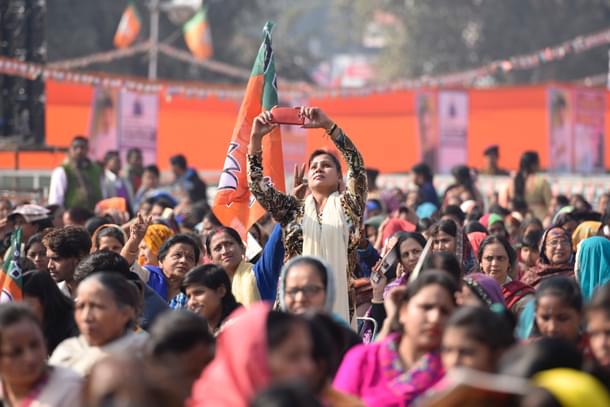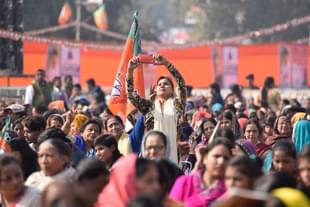Politics
It’s Not Just Pulwama: BJP’s Focus On The Struggling Homemaker, And Not The Elite Opinion-Maker, Produced Results
Ananth Krishna
Jun 11, 2019, 12:11 PM | Updated 12:10 PM IST
Save & read from anywhere!
Bookmark stories for easy access on any device or the Swarajya app.


The 2019 Lok Sabha elections are historic for a multitude of reasons, with the huge mandate that the electorate has handed the Narendra Modi-led Bharatiya Janata Party (BJP).
Many credit the BJP’s massive win only to the issue of national security. However, that would be a disservice. There are a lot of other factors for Modi’s re-election, and arguably one of the most important is the faith that women voters across the country have reposed in him: the CSDS-Lokniti survey reveals that the BJP enjoys substantial support from women, much more than the Congress, whose de facto head is a woman herself.
Why are women voting in such huge numbers for a party that is alleged to have practised “brahmanical patriarchy”? A look under the veneer will reveal the interplay of several factors. The BJP is the party of choice for women not only because of the general predisposition of the electorate after the Pulwama terrorist attack and the subsequent Balakot air strikes, but also due to the effective implementation of several government schemes as well.
A combination of schemes aimed to promote women and general welfare has provided the basis for widespread BJP support among women across caste and class divides. The CSDS survey reveals that many women voters rated the Ujjwala Yojana as the most attractive scheme that the National Democratic Alliance (NDA) government had implemented.
The impact of the Ujjwala Yojana might not appear to be great prima facie, but the programme has had a tangible impact on millions of women by providing them with LPG connections and replacing traditional cooking infrastructure. Another highly-rated scheme of the Union government that has influenced women voters is the Jan Dhan Yojana (JDY). It is aimed at higher financial inclusion. Not only did it achieve its objectives with 35 crore accounts being opened, but also facilitated the financial inclusion of women who received a significant boost with more than half of these accounts belonging to them.
Financial independence for women is a huge but an underrated aspect of their empowerment. Women who are financially independent are able to make decisions of their own volition, which can spur economic progress. Similarly, the MUDRA scheme also aims to empower women entrepreneurs by providing loans of up to Rs 10 lakh for micro/small firms. With 75 per cent of the 14 crore loans given out to female entrepreneurs, such an impact is not without basis.
One can also look at the Atal Pension Yojana, 40 per cent of whose beneficiaries are women, as well as the SAUBHAGYA household electrification scheme as examples of government initiatives women have benefited from. A common thread that can be seen in these schemes is that while they were focussed on the general public and not necessarily on women, yet, they provided the basis for a significant boost for women’s empowerment.
The empowerment of women is not limited to reservation, scholarships and stricter criminal prosecutions for sexual violence. Aiming to improve the everyday lives of millions of women has been the focus of the previous government. This approach has yielded dividends during the recent polls. Reducing women’s issues merely to political representation and safety is only a part of the empowerment story. Promoting the general welfare of the public at large inevitably benefits women who form half of the populace.
Rather than treating women as a “disadvantaged group” in need of cajoling, the BJP has treated them as equal stakeholders in the nation building programme. Targeted, specific interventions were made to benefit women, but not to the detriment of any other group. Muslim women might not have taken to voting for the BJP in the numbers that was envisioned in the wake of the triple talaq bill, but it did expose to the wider electorate the hypocrisy and nefarious designs of the 'secular’ parties and the 'liberal’ and 'feminist' intelligentsia.
Rather than focussing on the opinions of a narrow class of elitist women, who opinionate aloud from air-conditioned rooms, the government chose to empower the poorest of the poor women by providing them with basic utilities of life. And therein lies the crucial difference between bogus narratives and ground realities.
Ananth Krishna is a lawyer and observer of Kerala's politics.





